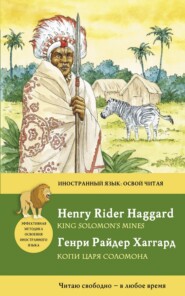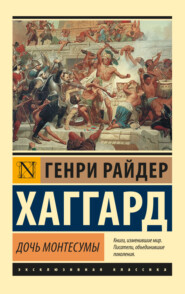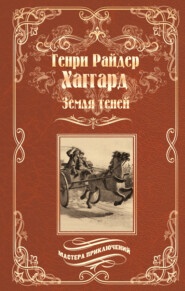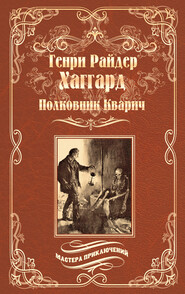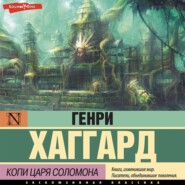По всем вопросам обращайтесь на: info@litportal.ru
(©) 2003-2024.
✖
Elissa: or The Doom of Zimbabwe
Настройки чтения
Размер шрифта
Высота строк
Поля
"The mysteries of worship!" answered Issachar scornfully. "Ay! the mysteries of the worship of that fair body of hers, that ivory chalice filled with foulness – whereof, if a man drink, his faith shall be rotted and his soul poisoned. The mysteries of that worship was it, Prince, that caused you but now to lean towards this woman as though to embrace her, with words of love burning in your heart if not between your lips? Ah! these witches of Baaltis know their trade well; they are full of evil gifts, and of the wisdom given to them by the fiend they serve. With touch and sigh and look they can stir the blood of youth, having much practice in the art, till it seethes within the veins and drowns conscience in its flood.
"Nay, Prince, hear the truth," continued Issachar. "Till moonrise you had never seen this woman, and now your quick blood is aflame, and you love her. Deny it if you can – deny it on your honour and I will believe you, for you are no liar."
Aziel thought for a moment and answered:
"Issachar, you have no right to question me on this matter, yet since you have adjured me by my honour, I will be open with you. I do not know if I love this woman, who, as you say, is a stranger to me, but it is true that my heart turns towards her like flowers to the sun. Till to-day I had never seen her, yet when my eyes first fell upon her face yonder in that accursed grove, it seemed to me that I had been born only that I might find her. It seemed to me even that for ages I had known her, that for ever she was mine and that I was hers. Read me the riddle, Issachar? Is this but passion born of youth and the sudden sight of a fair woman? That cannot be, for I have known others as fair, and have passed through some such fires. Tell me, Issachar, you who are old and wise and have seen much of the hearts of men, what is this wave that overwhelms me?"
"What is it, Prince? It is witchery; it is the wile of Beelzebub waiting to snatch your soul, and if you hearken to it you shall pass through the fire – through the fire to Moloch, if not in the flesh, then in the spirit, which is to all eternity. Oh! not in vain do I fear for you, my son, and not without reason was I warned in a dream. Listen: Last night, as I lay in my tent yonder upon the plain, I dreamed that some danger overshadowed you, and in my sleep I prayed that your destiny might be revealed to me. As I prayed thus, I heard a voice saying, ‘Issachar, you seek to learn the future; know then that he who is dear to you shall be tried in the furnace indeed. Yes, because of his great love and pity, he shall forswear his faith, and with death and sorrow he shall pay the price of his sin.’
"Then I was troubled and besought Heaven that you, my son, might be saved from this unknown temptation, but the voice answered me:
"’Of their own will only can they who were one from the beginning be held apart. Through good and ill let them work each other’s woe or weal. The goal is sure, but they must choose the road.’
"Now as I wondered what these dark sayings might mean, the gloom opened and I saw you, Aziel, standing in a grove of trees, while towards you with outstretched hands drew a veiled woman who bore upon her brow the golden bow of Baaltis. Then fire raged about you, and in the fire I beheld many things which I have forgotten, and moving through it was the Prince of Death, who slew and slew and spared not. So I awoke heavy at heart, knowing that there had fallen on me who love you a shadow of doom to come."
In these latter days any educated man would set aside Issachar’s wild vision as the vapourings of a mind distraught. But Aziel lived in the time of Solomon, when men of his nation guided their steps by the light of prophecy, and believed that it was the Divine pleasure, by means of dreams and wonders and through the mouths of chosen seers, to declare the will of Jehovah upon earth. To this faith, indeed, we still hold fast, at least so far as that period and people are concerned, seeing that we acknowledge Isaiah, David, and their company, to have been inspired from above. Of that company Issachar the Levite was one, for to him, from his youth up, voices had spoken in the watches of the night, and often he had poured his warnings and denunciations into the ears of kings and peoples, telling them with no uncertain voice of the consequences of sin and idolatry, and of punishment to come. This Aziel, who had been his ward and pupil, knew well, and therefore he did not mock at the priest’s dream or set it aside as naught, but bowed his head and listened.
"I am honoured indeed," he said with humility, "that the destiny of my poor soul and body should be a thing of weight to those on high."
"Of your poor soul, Aziel?" broke in Issachar. "That soul of yours, of which you speak so lightly, is of as great value in the eyes of Heaven as that of any cherubim within its gates. The angels who fell were the first and chiefest of the angels, and though now we are clad with mortal shape in punishment of our sins, again redeemed and glorified we can become among the mightiest of their hosts. Oh! my son, I beseech you, turn from this woman while there yet is time, lest to you her lips should be a cup of woe and your soul shall pay the price of them, sharing the hell of the worshippers of Ashtoreth."
"It may be so," said Aziel; "but, Issachar, what said the voice? That this, the woman of your dream and I were one from the beginning? Issachar, you believe that the lady Elissa is she of whom the voice spoke in your sleep and you bid me turn from her because she will bring me sin and punishment. In truth, if I can, I will obey you, since rather than forswear my faith, as your dream foretold, I would die a hundred deaths. Nor do I believe that for any bribe of woman’s love I shall forswear it in act or thought. Yet if such things come about it is fate that drives me on, not my will – and what man can flee his fate? But even though this lady be she whom I am doomed to love, you say that because she is heathen I must reject her. Shame upon the thought, for if she is heathen it is through ignorance, and it may be mine to change her heart. Because I stand in danger shall I suffer her who, as you tell me, was one with me from the beginning, to be lost in that hell of Baal of which you speak? Nay, your dream is false. I will not renounce my faith, but rather will win her to share it, and together we shall triumph, and that I swear to you, Issachar."
"Truly the evil one has many wiles," answered the Levite, "and I did ill to tell you of my dream, seeing that it can be twisted to serve the purpose of your madness. Have your will, Aziel, and reap the fruit of it, but of this I warn you – that while I can find a way to thwart it, never, Prince, shall you take that witch to your bosom to be the ruin of your life and soul."
"Then, Issachar, on this matter there may be war between us!"
"Ay! there is war," said the Levite, and left him.
* * *
The sun was already high in the heavens when Aziel awoke from the deep and dreamless sleep which followed on the excitements and exhaustion of the previous day. After his servants had waited upon him and robed him, bringing him milk and fruit to eat, he dismissed them, and sat himself down by the casement of his chamber to think a while.
Below him lay the city of flat-roofed houses enclosed with a double wall, without the ring of which were thousands of straw huts, shaped like bee-hives, wherein dwelt natives of the country, slaves or servants of the occupying Phœnician race. To Aziel’s right, and not more than a hundred paces from the governor’s house in which he was, rose the round and mighty battlements of the temple, where the followers of El and Baaltis worshipped, and the gold refiners carried on their business. At intervals on its flat-topped walls stood towers of observation, alternating with pointed monoliths of granite and soapstone columns supporting vultures, rudely carved emblems of Baaltis. Between these towers armed soldiers walked continually, watching the city below and the plain beyond, for though the mission of the Phœnicians here was one of peaceful gain it was evident that they considered it necessary to be always prepared for war. On the hillside above the great temple towered another fortress of stone – a citadel deemed to be impregnable even should the temple fall into the hands of an enemy – while on the crest of the precipitous slope, stretching as far to right and left as the eye could reach, were many smaller detached strongholds.
The scene that Aziel saw from his window was a busy one, for beneath him a market was being held in an open square in the city. Here, sheltered from the sun by grass-thatched booths, the Phœnician merchants who had been his companions in their long and perilous journey from the coast were already in treaty with numerous customers, hoping, not in vain, to recoup themselves amply for the toils and dangers which they had survived. Beneath these booths were spread their goods; silks from Cos, bronze weapons and copper rods, or ingots from the rich mines of Cyprus, linens and muslins from Egypt; beads, idols, carven bowls, knives, glass ware, pottery in all shapes, and charms made of glazed faience or Egyptian stone; bales of the famous purple cloth of Tyre; surgical instruments, jewellery, and objects of toilet; scents, pots of rouge, and other unguents for the use of ladies in little alabaster and earthenware vases; bags of refined salt, and a thousand other articles of commerce produced or stored in the workshops of Phœnicia. These the chapmen bartered for raw gold by weight, tusks of ivory, ostrich feathers, and girls of approved beauty, slaves taken in war, or in some instances maidens whom their unnatural parents or relatives did not scruple to sell into bondage.
In another portion of the square, provisions and stock, alive and dead, were being offered for sale, for the most part by natives of the country. Here were piles of vegetables and fruits grown in the gardens, sacks of various sorts of grain, bundles of green forage from the irrigated lands without the walls, calabashes full of curdled milk, thick native beer and trusses of reed for thatching. Here again were oxen, mules and asses, or great bucks such as we now know as eland or kudoo, carried in on rough litters of boughs to be disposed of by parties of savage huntsmen who had shot them with arrows or trapped them in pitfalls. Every Eastern tribe and nation seemed to be represented in the motley crowd. Yonder stalked savages, naked except for their girdles, and armed with huge spears, who gazed with bewilderment on the wonders of this mart of the white man; there moved grave, long-bearded Arab merchants or Phœnicians in their pointed caps, or bare-headed whiterobed Egyptians, or half-bred mercenaries clad in mail. Their variety was without end, while from them came a very babel of different tongues as they cried their wares, bargained and quarrelled.
Aziel gazed at this novel sight with interest, till, as he was beginning to weary of it, the crowd parted to right and left, leaving a clear lane across the market-place to the narrow gate of the temple. Along this lane advanced a procession of the priests of El clad in red robes, with tall red caps upon their heads, beneath which their straight hair hung down to their shoulders. In their hands were gilded rods, and round their necks hung golden chains, to which were attached emblems of the god they worshipped. They walked two-and-two to the number of fifty, chanting a melancholy dirge, one hand of each priest resting upon his fellow’s shoulder, and as they passed, with the exception of certain Jews, all the spectators uncovered, while some of the more pious of them even fell upon their knees.
After the priests came a second procession, that of the priestesses of Baaltis. These women, who numbered at least a hundred, were clad in white, and wore upon their heads a gauze-like veil that fell to the knees, and was held in place by a golden fillet surmounted with the symbol of a crescent moon. Instead of the golden rods, however, each of them held in her left hand a growing stalk of maize, from the sheathed cob of which hung the bright tassel of its bloom. On her right wrist, moreover, a milk-white dove was fastened by a wire, both corn and dove being tokens of that fertility which, under various guises, was the real object of worship of these people. The sight of these white-veiled women about whose crescentdecked brows the doves fluttered, wildly striving to be free, was very strange and beautiful as they advanced also singing a low and melancholy chant. Aziel searched their faces with his eyes while they passed slowly towards him, and presently his heart bounded, for there among them, clasping the dove she bore to her breast, as though to still its frightened strugglings, was the Lady Elissa. He noticed, too, that as she went beneath the palace walls, she glanced at the window-place of his chamber, but without seeing him for he was seated in the shadow.
Presently the long line of priestesses, followed by hundreds of worshippers, had vanished through the tortuous and narrow entrance of the temple, and Aziel leaned back to think.
There, among the principal votaries of a goddess, the wickedness of whose worship was a scandal and a by-word even in the ancient world, walked the woman to whom he felt so strangely drawn and with whom, if there were any truth in the visions of Issachar and the mysterious warnings of his own soul, his fate was intertwined. As he thought of it a sudden revulsion filled his heart. She was wise and beautiful, and she seemed innocent, but Issachar was right; this girl was the minister of an abominable creed; nay, for aught he knew, she was herself defiled with its abominations, and her wisdom but an evil gift from the evil powers she served. Could he, a prince of the royal blood of the House of Israel and of the ancient Pharaohs of Khem, desire to have anything to do with such an one, he a child of the Chosen People, a worshipper of the true and only God? Yesterday she had thrown a spell upon him, a spell of black magic, or the spell of her imperial beauty, which, it mattered not, but to-day he was the lord of his own mind, and would shake himself free of it and her.
* * *
In the market-place below, the Levite Issachar also had watched the passing of the priests and priestesses of El and Baaltis.
"Tell me, Metem," he asked of the Phœnician who stood beside him, his head respectfully uncovered, "what mummery is this?"
"It is no mummery, worthy Issachar, but a ceremony of public sacrifice, which is to be offered in the temple yonder, for the recovery from her sickness of the Lady Baaltis, the high-priestess."
"Where then is the offering. I see none, unless it be those doves that are tied to the wrists of the women?"
"Nay, Issachar," answered Metem smiling darkly, "the gods ask nobler blood than that of doves. The offering is within, and it is the first- born child of a priestess of Baaltis."
"O Lord of Heaven!" said Issachar lifting up his eyes, "how long will you suffer that this murderous and accursed race should defile the face of earth?"
"Softly, friend," broke in Metem, "I have read your Scriptures, and is it not set out in them that your great forefather was commanded to offer up his first-born in such a sacrifice?"
"Blaspheme not," answered the Jew. "He was commanded indeed, that his heart might be proved, but his hand was stayed. He Whom I worship delights not in the blood of children."
"Nay, Prince, hear the truth," continued Issachar. "Till moonrise you had never seen this woman, and now your quick blood is aflame, and you love her. Deny it if you can – deny it on your honour and I will believe you, for you are no liar."
Aziel thought for a moment and answered:
"Issachar, you have no right to question me on this matter, yet since you have adjured me by my honour, I will be open with you. I do not know if I love this woman, who, as you say, is a stranger to me, but it is true that my heart turns towards her like flowers to the sun. Till to-day I had never seen her, yet when my eyes first fell upon her face yonder in that accursed grove, it seemed to me that I had been born only that I might find her. It seemed to me even that for ages I had known her, that for ever she was mine and that I was hers. Read me the riddle, Issachar? Is this but passion born of youth and the sudden sight of a fair woman? That cannot be, for I have known others as fair, and have passed through some such fires. Tell me, Issachar, you who are old and wise and have seen much of the hearts of men, what is this wave that overwhelms me?"
"What is it, Prince? It is witchery; it is the wile of Beelzebub waiting to snatch your soul, and if you hearken to it you shall pass through the fire – through the fire to Moloch, if not in the flesh, then in the spirit, which is to all eternity. Oh! not in vain do I fear for you, my son, and not without reason was I warned in a dream. Listen: Last night, as I lay in my tent yonder upon the plain, I dreamed that some danger overshadowed you, and in my sleep I prayed that your destiny might be revealed to me. As I prayed thus, I heard a voice saying, ‘Issachar, you seek to learn the future; know then that he who is dear to you shall be tried in the furnace indeed. Yes, because of his great love and pity, he shall forswear his faith, and with death and sorrow he shall pay the price of his sin.’
"Then I was troubled and besought Heaven that you, my son, might be saved from this unknown temptation, but the voice answered me:
"’Of their own will only can they who were one from the beginning be held apart. Through good and ill let them work each other’s woe or weal. The goal is sure, but they must choose the road.’
"Now as I wondered what these dark sayings might mean, the gloom opened and I saw you, Aziel, standing in a grove of trees, while towards you with outstretched hands drew a veiled woman who bore upon her brow the golden bow of Baaltis. Then fire raged about you, and in the fire I beheld many things which I have forgotten, and moving through it was the Prince of Death, who slew and slew and spared not. So I awoke heavy at heart, knowing that there had fallen on me who love you a shadow of doom to come."
In these latter days any educated man would set aside Issachar’s wild vision as the vapourings of a mind distraught. But Aziel lived in the time of Solomon, when men of his nation guided their steps by the light of prophecy, and believed that it was the Divine pleasure, by means of dreams and wonders and through the mouths of chosen seers, to declare the will of Jehovah upon earth. To this faith, indeed, we still hold fast, at least so far as that period and people are concerned, seeing that we acknowledge Isaiah, David, and their company, to have been inspired from above. Of that company Issachar the Levite was one, for to him, from his youth up, voices had spoken in the watches of the night, and often he had poured his warnings and denunciations into the ears of kings and peoples, telling them with no uncertain voice of the consequences of sin and idolatry, and of punishment to come. This Aziel, who had been his ward and pupil, knew well, and therefore he did not mock at the priest’s dream or set it aside as naught, but bowed his head and listened.
"I am honoured indeed," he said with humility, "that the destiny of my poor soul and body should be a thing of weight to those on high."
"Of your poor soul, Aziel?" broke in Issachar. "That soul of yours, of which you speak so lightly, is of as great value in the eyes of Heaven as that of any cherubim within its gates. The angels who fell were the first and chiefest of the angels, and though now we are clad with mortal shape in punishment of our sins, again redeemed and glorified we can become among the mightiest of their hosts. Oh! my son, I beseech you, turn from this woman while there yet is time, lest to you her lips should be a cup of woe and your soul shall pay the price of them, sharing the hell of the worshippers of Ashtoreth."
"It may be so," said Aziel; "but, Issachar, what said the voice? That this, the woman of your dream and I were one from the beginning? Issachar, you believe that the lady Elissa is she of whom the voice spoke in your sleep and you bid me turn from her because she will bring me sin and punishment. In truth, if I can, I will obey you, since rather than forswear my faith, as your dream foretold, I would die a hundred deaths. Nor do I believe that for any bribe of woman’s love I shall forswear it in act or thought. Yet if such things come about it is fate that drives me on, not my will – and what man can flee his fate? But even though this lady be she whom I am doomed to love, you say that because she is heathen I must reject her. Shame upon the thought, for if she is heathen it is through ignorance, and it may be mine to change her heart. Because I stand in danger shall I suffer her who, as you tell me, was one with me from the beginning, to be lost in that hell of Baal of which you speak? Nay, your dream is false. I will not renounce my faith, but rather will win her to share it, and together we shall triumph, and that I swear to you, Issachar."
"Truly the evil one has many wiles," answered the Levite, "and I did ill to tell you of my dream, seeing that it can be twisted to serve the purpose of your madness. Have your will, Aziel, and reap the fruit of it, but of this I warn you – that while I can find a way to thwart it, never, Prince, shall you take that witch to your bosom to be the ruin of your life and soul."
"Then, Issachar, on this matter there may be war between us!"
"Ay! there is war," said the Levite, and left him.
* * *
The sun was already high in the heavens when Aziel awoke from the deep and dreamless sleep which followed on the excitements and exhaustion of the previous day. After his servants had waited upon him and robed him, bringing him milk and fruit to eat, he dismissed them, and sat himself down by the casement of his chamber to think a while.
Below him lay the city of flat-roofed houses enclosed with a double wall, without the ring of which were thousands of straw huts, shaped like bee-hives, wherein dwelt natives of the country, slaves or servants of the occupying Phœnician race. To Aziel’s right, and not more than a hundred paces from the governor’s house in which he was, rose the round and mighty battlements of the temple, where the followers of El and Baaltis worshipped, and the gold refiners carried on their business. At intervals on its flat-topped walls stood towers of observation, alternating with pointed monoliths of granite and soapstone columns supporting vultures, rudely carved emblems of Baaltis. Between these towers armed soldiers walked continually, watching the city below and the plain beyond, for though the mission of the Phœnicians here was one of peaceful gain it was evident that they considered it necessary to be always prepared for war. On the hillside above the great temple towered another fortress of stone – a citadel deemed to be impregnable even should the temple fall into the hands of an enemy – while on the crest of the precipitous slope, stretching as far to right and left as the eye could reach, were many smaller detached strongholds.
The scene that Aziel saw from his window was a busy one, for beneath him a market was being held in an open square in the city. Here, sheltered from the sun by grass-thatched booths, the Phœnician merchants who had been his companions in their long and perilous journey from the coast were already in treaty with numerous customers, hoping, not in vain, to recoup themselves amply for the toils and dangers which they had survived. Beneath these booths were spread their goods; silks from Cos, bronze weapons and copper rods, or ingots from the rich mines of Cyprus, linens and muslins from Egypt; beads, idols, carven bowls, knives, glass ware, pottery in all shapes, and charms made of glazed faience or Egyptian stone; bales of the famous purple cloth of Tyre; surgical instruments, jewellery, and objects of toilet; scents, pots of rouge, and other unguents for the use of ladies in little alabaster and earthenware vases; bags of refined salt, and a thousand other articles of commerce produced or stored in the workshops of Phœnicia. These the chapmen bartered for raw gold by weight, tusks of ivory, ostrich feathers, and girls of approved beauty, slaves taken in war, or in some instances maidens whom their unnatural parents or relatives did not scruple to sell into bondage.
In another portion of the square, provisions and stock, alive and dead, were being offered for sale, for the most part by natives of the country. Here were piles of vegetables and fruits grown in the gardens, sacks of various sorts of grain, bundles of green forage from the irrigated lands without the walls, calabashes full of curdled milk, thick native beer and trusses of reed for thatching. Here again were oxen, mules and asses, or great bucks such as we now know as eland or kudoo, carried in on rough litters of boughs to be disposed of by parties of savage huntsmen who had shot them with arrows or trapped them in pitfalls. Every Eastern tribe and nation seemed to be represented in the motley crowd. Yonder stalked savages, naked except for their girdles, and armed with huge spears, who gazed with bewilderment on the wonders of this mart of the white man; there moved grave, long-bearded Arab merchants or Phœnicians in their pointed caps, or bare-headed whiterobed Egyptians, or half-bred mercenaries clad in mail. Their variety was without end, while from them came a very babel of different tongues as they cried their wares, bargained and quarrelled.
Aziel gazed at this novel sight with interest, till, as he was beginning to weary of it, the crowd parted to right and left, leaving a clear lane across the market-place to the narrow gate of the temple. Along this lane advanced a procession of the priests of El clad in red robes, with tall red caps upon their heads, beneath which their straight hair hung down to their shoulders. In their hands were gilded rods, and round their necks hung golden chains, to which were attached emblems of the god they worshipped. They walked two-and-two to the number of fifty, chanting a melancholy dirge, one hand of each priest resting upon his fellow’s shoulder, and as they passed, with the exception of certain Jews, all the spectators uncovered, while some of the more pious of them even fell upon their knees.
After the priests came a second procession, that of the priestesses of Baaltis. These women, who numbered at least a hundred, were clad in white, and wore upon their heads a gauze-like veil that fell to the knees, and was held in place by a golden fillet surmounted with the symbol of a crescent moon. Instead of the golden rods, however, each of them held in her left hand a growing stalk of maize, from the sheathed cob of which hung the bright tassel of its bloom. On her right wrist, moreover, a milk-white dove was fastened by a wire, both corn and dove being tokens of that fertility which, under various guises, was the real object of worship of these people. The sight of these white-veiled women about whose crescentdecked brows the doves fluttered, wildly striving to be free, was very strange and beautiful as they advanced also singing a low and melancholy chant. Aziel searched their faces with his eyes while they passed slowly towards him, and presently his heart bounded, for there among them, clasping the dove she bore to her breast, as though to still its frightened strugglings, was the Lady Elissa. He noticed, too, that as she went beneath the palace walls, she glanced at the window-place of his chamber, but without seeing him for he was seated in the shadow.
Presently the long line of priestesses, followed by hundreds of worshippers, had vanished through the tortuous and narrow entrance of the temple, and Aziel leaned back to think.
There, among the principal votaries of a goddess, the wickedness of whose worship was a scandal and a by-word even in the ancient world, walked the woman to whom he felt so strangely drawn and with whom, if there were any truth in the visions of Issachar and the mysterious warnings of his own soul, his fate was intertwined. As he thought of it a sudden revulsion filled his heart. She was wise and beautiful, and she seemed innocent, but Issachar was right; this girl was the minister of an abominable creed; nay, for aught he knew, she was herself defiled with its abominations, and her wisdom but an evil gift from the evil powers she served. Could he, a prince of the royal blood of the House of Israel and of the ancient Pharaohs of Khem, desire to have anything to do with such an one, he a child of the Chosen People, a worshipper of the true and only God? Yesterday she had thrown a spell upon him, a spell of black magic, or the spell of her imperial beauty, which, it mattered not, but to-day he was the lord of his own mind, and would shake himself free of it and her.
* * *
In the market-place below, the Levite Issachar also had watched the passing of the priests and priestesses of El and Baaltis.
"Tell me, Metem," he asked of the Phœnician who stood beside him, his head respectfully uncovered, "what mummery is this?"
"It is no mummery, worthy Issachar, but a ceremony of public sacrifice, which is to be offered in the temple yonder, for the recovery from her sickness of the Lady Baaltis, the high-priestess."
"Where then is the offering. I see none, unless it be those doves that are tied to the wrists of the women?"
"Nay, Issachar," answered Metem smiling darkly, "the gods ask nobler blood than that of doves. The offering is within, and it is the first- born child of a priestess of Baaltis."
"O Lord of Heaven!" said Issachar lifting up his eyes, "how long will you suffer that this murderous and accursed race should defile the face of earth?"
"Softly, friend," broke in Metem, "I have read your Scriptures, and is it not set out in them that your great forefather was commanded to offer up his first-born in such a sacrifice?"
"Blaspheme not," answered the Jew. "He was commanded indeed, that his heart might be proved, but his hand was stayed. He Whom I worship delights not in the blood of children."
Вы ознакомились с фрагментом книги.
Приобретайте полный текст книги у нашего партнера:
Приобретайте полный текст книги у нашего партнера:






